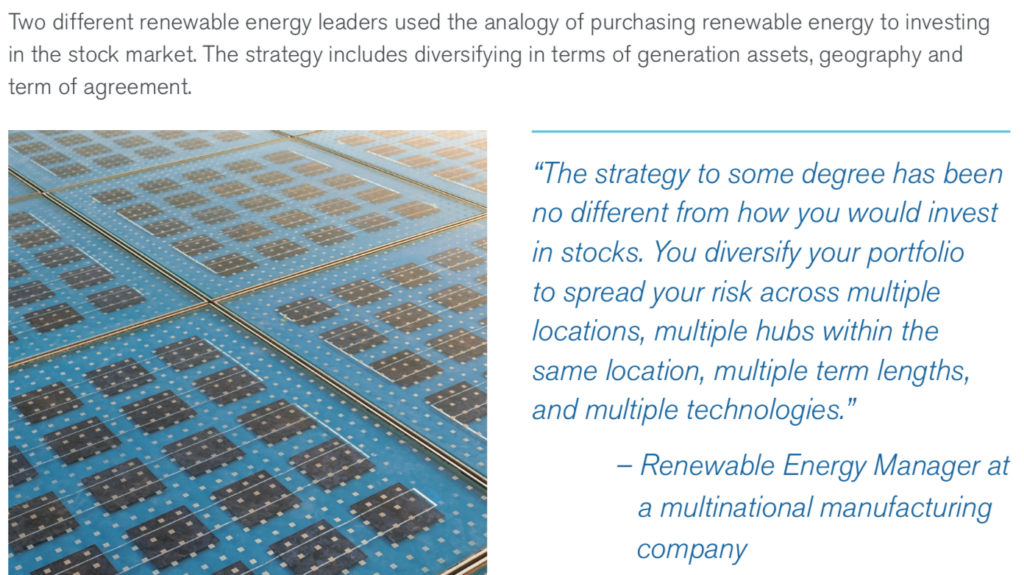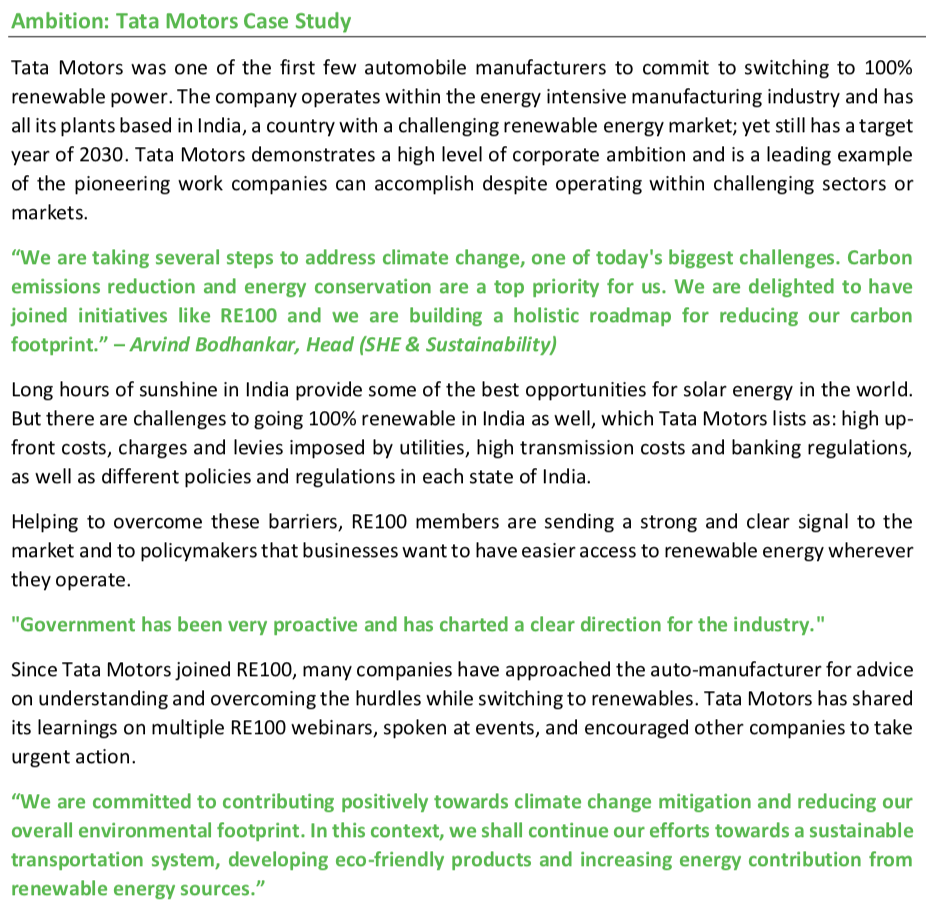It has become increasingly popular for companies of all sizes and industries, all over the world, to procure renewable energy. Traditionally, environmental concerns motivated companies to shift their procurement practices, but now, cost-savings and hedging against volatile electricity prices are also important motivators.
Main Points
- Corporate procurement of renewable energy refers to the strategic process of sourcing energy needs from renewable energy suppliers and distributors.
- Companies are shifting their procurement strategies for various reasons: corporate social responsibility, cost-saving, supply diversification, and reputational goals.
First, Read This
Companies globally are motivated more than ever to procure renewables because of the significant decrease in cost of solar and wind energy over the past few decades.
Active corporate sourcing of renewables, the process through which non-energy companies procure or invest in the self-generation of renewable energy for their own operations, is growing around the world (IRENA, 2018a). The dramatic cost reductions experienced by renewable energy technologies, especially solar PV and wind, have increased the attractiveness of renewables as an energy source for corporations. Companies that choose to procure their energy from renewables (including for power, heat and transport) are increasingly motivated by economic benefits such as cost savings, long-term price stability and security of supply, rather than by pure social and environmental concerns (IRENA, 2018a).
Read Excerpt: page 41 from Global Landscape of Renewable Energy Finance, 2020 by IRENA.
Next, Consider This
The commercial and industrial sector account for a majority of the world’s end-use of electricity, and many of these companies are shifting to meeting their electricity needs with electricity from renewable sources. In addition to providing sustainability benefits, renewable procurement increasingly offers attractive cost-savings.
A revolution is underway in the power sector and governments, corporations, and other stakeholders all over the world are springing into action. The aftermath of the Paris Agreement and the Sustainable Development Goals have set a clear direction for the transition that the energy sector, and specifically the power sector, must undergo in the coming decades: electricity generation must be fully decarbonized by mid-century, at the latest.
The industrial and commercial sectors consume two-thirds of all electricity produced worldwide. This means businesses can play an essential part in enabling the structural shift to clean power. Today, businesses are spending billions on energy bills increasingly being directed towards renewable electricity. Companies are building the infrastructure, selling the services and inventing tomorrow’s technologies to deliver the clean energy transition. As they recognize the need for their contribution to reducing greenhouse gas emissions for a climate-safe world – and the rapidly falling cost of renewable electricity – many companies want to source renewable power whilst also supporting the transition in a proactive, meaningful, and commercially advantageous way.
Read Excerpt: RE100 Leadership Report by RE100, The Climate Group, and CDP.
Now, See This
Companies are motivated by renewable energy’s declining technology costs, as well as the potential for more stable electricity prices and less susceptibility to supply disruptions.

Read Excerpt: Pages 4-5 from Guide to Purchasing Green Power by the United States Environmental Protection Agency.
From 2010 to 2020, the levelized cost of energy (LCOE) declined significantly for renewable energy technologies.

See: Figure ES.2 on page 15 from Renewable Power Generation Costs in 2020 by IRENA.
And See This
In addition to economic factors, there are specific environmental advantages associated with renewable energy as well–namely, reducing a company’s carbon footprint, air pollution and water environmental impacts. Improving environmental impact often helps meet customer and investor demands.

Read Excerpt: Page 3 from Guide to Purchasing Green Power by the United States Environmental Protection Agency.
Now, Consider This Perspective
Procuring electricity is a form of investment for organizations. Therefore, a diversified electricity portfolio may provide benefits similar to a diversified asset portfolio.

Read Excerpt: Page 10 from State of Corporate Renewable Energy Procurement by Apex Clean Energy and GreenBiz group.
Finally, Consider These Examples
Numerous corporations are leading the transition to clean power by committing to 100% renewable energy (RE100 members). Companies around the world face various barriers to renewable energy procurement, but they can overcome these obstacles to send a signal to the market and policymakers.

Read Case Study: Page 11 from RE100 Leadership Report by RE100, The Climate Group, and CDP.
Rather than continuing to procure energy from traditional sources, corporations are seeking alternative energy options that better fulfill operational needs and may be an improvement compared to their current electricity service.
One of Marico’s biggest successes in sustainability is our Perundurai unit in South India, our Green Manufacturing Unit which uses only green energy sources – wind energy for power consumption and agro-based fuel in boilers. Looking at frequent power cuts as an opportunity rather than a problem, we took the decision to shift from electricity to wind energy, following the group captive model. A move that helped us achieve annual savings of INR 16 lacs and a reduction in GHG emissions of 1,700 tons of CO2e/year.
Read Excerpt: Page 42 from Marico Sustainability Report by Marico.
Suggested Actions & Next Steps
- Investigate: Has your corporation considered investing in renewable energy? Talk to your colleagues about the idea. What departments were involved? What was the outcome? What obstacles did your colleagues face?
- Think it over: What are your corporation’s top priorities (cost-savings, reputation, ESG, etc)? How might renewable energy contribute to those priorities? Make note of these thoughts to keep in mind as you plan your procurement.
- Research: Has your country or state set any renewable energy goals? Have any competitors made public renewable energy commitments?
- Reference: Indonesia, India, Vietnam, and Southeast Asia (pages 9-10).

